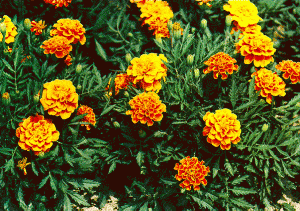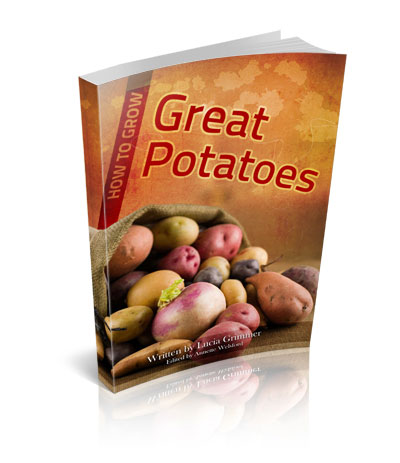Integrated Control Options for Root Knot Nematodes Part 2
Following on from Part 1 of this article where we talked about what root knot nematode (RKN) is, the symptoms and some soft options for control, in this article, we look at the rest of the tools that can be used in an integrated control strategy.
Crop Rotation with Tolerant Crops
Rotate susceptible crops, or crops which have become badly infected, with crops of brassicas such as cauliflower and cabbage or other crops such as strawberries.
Recent research has also shown that the addition of forage brassicas (a type of mustard) to the soil not only adds extra organic matter – thus helping to improve soil structure – but also helps to control nematodes and helps to prevent weed seed from germinating. The reason for this is that all brassicas produce a chemical which breaks down in wet soil to produce a cyanide-like gas. This reduces soil borne diseases (unfortunately, some good microbes too) and also helps to reduce nematodes (but does not seem to affect earthworms). There is a specific brassica known as “Nemcon Fumigation Brassica’ which produces higher concentrations of gas than the other brassicas.
Forage brassicas should be planted in autumn and dug in just before flowering whilst keeping the soil moist. They can be also slashed and left on the surface – although this is not quite as effective – where it is impractical to dig it in (because of pipes etc).
A wide range of other plants, produce chemicals that are antagonistic to nematodes. These include : castor bean, chrysanthemum, crotalaria, indigo, jackbean, partridge pea, sesame, sorghum-sudan and velvet bean. All of these crops can be used in rotations or mix-cropped with vegetables. Sun hemp, a tropical legume, and sorghum-sudan, a prolific grass crop plant are popular cover crops that can be grown for their nematode-suppressive properties between vegetable crops.
Soil Solarisation
Soil solarization as described by Wikipedia is “an environmentally friendly method of using solar power for controlling disease agents in the soil by mulching the soil and covering it with tarp, usually with a transparent polyethylene cover, to trap solar energy. It may also describe methods of decontaminating soil using sunlight or solar power”.
Essentially, this is a method of heating the soil so as to kill insect pests, diseases and nematodes. It is simple, cheap and effective.
Rotation and Inter-planting With Marigolds
 Most varieties of marigold (Tagetes species) are resistant to RKN because their roots secrete nematicidal chemicals. Research shows that tomatoes planted 2 weeks after African marigolds were dug in showed a 99% reduction root lesion nematode (different from RKN, but a damaging nematode nonetheless). This makes marigolds an ideal rotation crop or inter-planting crop to be planted within or around your vegetable crop. Petite Harmony and Petite Yellow are known to be particularly effective.
Most varieties of marigold (Tagetes species) are resistant to RKN because their roots secrete nematicidal chemicals. Research shows that tomatoes planted 2 weeks after African marigolds were dug in showed a 99% reduction root lesion nematode (different from RKN, but a damaging nematode nonetheless). This makes marigolds an ideal rotation crop or inter-planting crop to be planted within or around your vegetable crop. Petite Harmony and Petite Yellow are known to be particularly effective.
If you want to treat a previously infected area of your veggie garden, plant your marigolds in strips or blocks within this area. You can treat a section of your veggie patch at a time. To do this, plant seed or seedlings about 15 cm (6 inches) apart and keep weeds out until the marigold plants have canopied. After flowering, remove the seed heads and keep some seed for the next crop. Removing heads will also reduce volunteers in your subsequent veggie crop. After removing the heads, incorporate the marigolds into the soil with a fork. (A fork is better than a spade, especially if you have nice populations of earthworms in your garden). You can also inter-plant your crops with marigolds which will act as a deterrent to RKN.
Destruction of Infected Roots
Where a crop has become infected, it is imperative to dig up roots and destroy them immediately after your crop is harvested. This will remove a large proportion of the nematodes which would otherwise carry over to infect the next season’s crop.
Reducing Crop Stress
Any crop which is stressed will more easily succumb to infections, not only from pests and diseases, but also from nematodes. Use mulch, water regularly and fertilise.
Finally:
Use of Kelpak®,to Generate Root Growth
Kelpak is a natural seaweed extract available in many countries around the world. It generates new root growth. This seaweed product can be used where an infestation has or is occurring in a crop. It does not control the nematode, but rather, it induces new root growth to compensate for loss of root mass caused by RKN. In some areas, where resistance is occurring to hardline nematacides, use of products like Kelpak, help a crop effectively overcome nematode damage and reduces yield losses.
Silica
Use of products that contain silica, such as diatomaceous earth, also help to control nematode and RKN damage. Diatomaceous earth would need to be incorporated before planting, but there are liquid silica products available that can be watered into a crop where the known risk for nematode damage is high eg tomatoes in sandy soil. If used on a regular basis throughout the crop life, such silica products will deter nematode infestation and damage and enable you to harvest a good crop.
I hope all these pointers have been a help.
Good luck!
Lucia Grimmer
Tags: pests, potato diseases, tomato diseases











